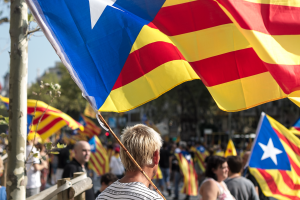1648
The Peace of Westphalia brought relative peace to Europe. The Westphalian system is established, and sovereignty is endowed in a new political body, the state. Now, this political entity enjoys the principles of equality and non-intervention, amongst and between states.
Since then, empires have fallen and states collapsed, wars fought and borders drawn. Concepts of identity have shifted, as some people begin to identify with the state, while others hold on to an identity molded by their ethnic and linguistic history.
2017
There are now 195 independent states in the world. In today’s world, independence movements like the Kurdish referendum and the Catalonia referendum demonstrate the frustration of groups who have been left behind in modern state building and border drawing.
Both the Kurds and Catalans have a strong sense of nationhood that comes from a shared heritage, including their linguistic identity and ethnicity as well as
shared moral values. And ultimately, they see themselves as social and cultural entities who lack their self-determined right to political sovereignty.
What do you do if you are a nation without a state?
One option is to hold an independence referendum. This can result in movement towards political independence, meaning that you earn sovereignty over your affairs and gain the equality that is granted to independent states in the international arena.
Independence referendums hold a variety of possibilities, but also many consequences.

Why hold an independence referendum?
After the Kurds were denied statehood following World War I, they became scattered across several states. In the following years, they were forced to live in states which would inflict human rights violations and violent atrocities on the Kurdish people. It was exactly their statelessness that made the Kurds vulnerable. Without their own borders, the Kurds had no power to claim their sovereign rights and no formal government dedicated to representing and protecting their voice. So, a reasonable question to ask is, why would the Kurds want to be apart of a state that has repeatedly denied them their own right to identify as Kurds and then attacked them for that identity?
Catalonia too has experienced waves of repression and autonomy under Spanish rule. Once an autonomous region, the nation has a remembrance of their defeat. In 2010, Spain removed Catalonia’s status as an autonomous nation with its own certain independences. This action halted the region’s independence movement, and attacked the Catalan ability to choose their political and educational language.
In the past two months, both the Kurds and the Catalans have held independence referendums despite threats from Iraq and Spain. Though political independence seemed unlikely, holding a referendum means more than seceding from a hostile state. An independence referendum with a democratic vote holds significant meaning to the international community, signaling that they feel that their state fails to serve their needs.
A vote is a statement for change.
Catalonia wants Spain to allow for more Catalonian autonomy and to recognize Spain’s multilingual, multicultural nature. An independence referendum is an expression of self-determination and is an symbolic action for a strong ethnic group. The Kurds want to express their determination for a state formed by Kurds and that will protect not only Kurdish people, but anyone living within their borders, unlike the Iraqi government. Independence referendums often lay the groundwork for future dialogue, and for a more democratic process where political and social change can take place that will benefit marginalized identities.
Both nationalities have faced increasing backlash from Iraq and Spain. Catalan voters faced shocking violence from Spanish forces, while Iraq violently took back Kirkuk and other areas previously under Kurdish control. Each referendum has affected regional politics, and both caused significant economic backlash for the normally thriving regions. In recent days, Carles Puigdemont fled to Belgium after declaring Catalonian independence from Spain, and Madrid responded with rebellion and sedition charges. Meanwhile, the President of the Iraqi Kurdistan Regional Government, Masoud Barzani announced he would step down.
It seems that a failed independence referendum is a catastrophe for its leaders, but perhaps, the people will feel the benefits in the future.


Leave a Reply